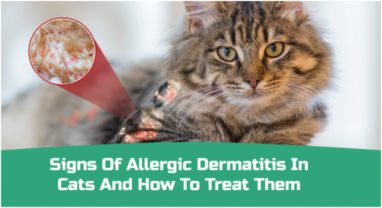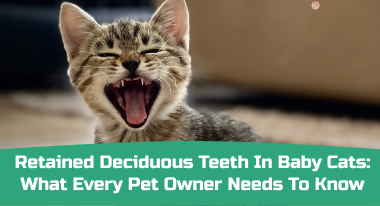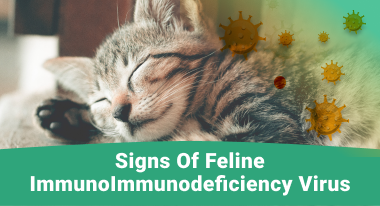Table of Contents
Does your furry friend have a knack for tummy troubles? It’s like they’ve got their own little digestive drama going on. Well, guess what? They might be dealing with irritable bowel syndrome (IBS). But don’t panic! Understanding IBS is the key to getting your kitty back to their purring, happy self.
About 10% of cats suffer from IBS. It’s a common issue that demands attention.[Source]
So, what exactly is IBS? It’s a fancy term for a not-so-fancy condition that wreaks havoc on your cat’s digestive system. Think frequent bouts of diarrhea, occasional vomiting, and an upset tummy that just won’t quit.
Ignoring those symptoms can lead to nutrient deficiencies, dehydration, and some serious damage to their delicate intestinal lining. That’s not something we want for our feline friends, right?
So, in this blog post, we’re going to dig deep into the causes, diagnosis, and treatment options for irritable bowel syndrome in cats. Get ready to equip yourself with all the knowledge you need to become a superhero for your furry companion.
What are the Key Differences between IBS & IBD?
Feline digestive disorders can be quite confusing, especially when it comes to two similar-sounding conditions: irritable bowel syndrome (IBS) and inflammatory bowel disease (IBD). Let me shed some light on the key differences between the two for you.
First off, let’s talk about IBS in cats. IBS is a gastrointestinal disorder- it is characterized by chronic digestive issues, such as diarrhea, constipation, vomiting, and stomach discomfort.
It’s often considered a functional disorder, meaning there are no visible signs of inflammation or structural abnormalities in the intestines. Instead, it’s thought to result from abnormal muscle contractions in the digestive tract. Think of it as a miscommunication between the brain and the gut.
On the other hand, we have IBD in cats, which stands for inflammatory bowel disease. Unlike IBS, IBD involves inflammation of the intestinal lining. This chronic condition is caused by an abnormal immune response to the cat’s own gut bacteria or food antigens.
Inflammation can lead to a host of symptoms, including diarrhea, weight loss, poor appetite, and vomiting. It’s like a constant battle going on inside the cat’s intestines, causing all sorts of havoc.
To sum it up, the key difference between IBS and IBD in cats lies in the presence of inflammation. IBS is characterized by functional issues without visible inflammation, while IBD involves inflammation of the intestinal lining. Both conditions can cause digestive woes, but the underlying mechanisms and treatment approaches differ.
| Aspect | Irritable Bowel Syndrome (IBS) | Inflammatory Bowel Disease (IBD) |
| Definition | A functional gastrointestinal disorder, it can be acute | Chronic inflammation of the intestinal lining |
| Cause | Abnormal muscle contractions in the gut | Abnormal immune response to gut bacteria or food antigens |
| Inflammation | No visible inflammation in the intestines | Inflammation of the intestinal lining |
| Clinical Signs | Chronic diarrhea, constipation, vomiting | Chronic diarrhea, weight loss, poor appetite |
| Long-Term Implications | Generally considered a manageable condition | Requires ongoing monitoring and treatment |
| Prognosis | Generally good prognosis with proper management | Can be challenging, with a potential for relapses |
Note: The table aims to provide a general overview, and each cat’s case may vary. It’s crucial to work closely with a veterinarian to obtain an accurate diagnosis and develop an appropriate treatment plan tailored to your cat’s specific needs.
What are the Key Symptoms of Irritable Bowel Syndrome in Cats?
IBS can bring about a whirlwind of symptoms, and it’s important to keep a keen eye out for any red flags.
Your fur baby starts having some tummy troubles, with diarrhea becoming a frequent visitor. Alongside this messy situation, you might notice a change in their appetite.
Some cats with IBD suddenly become bottomless pits, gobbling up their food. But on the flip side, other cats may experience a decrease in their appetite, leading to weight loss.
Also you may witness signs like vomiting and lethargy. Your once lively and playful pal may seem a bit more sluggish and uninterested in their usual antics.
Here are some signs to watch out for in your furry friend:
- Difficulty with bowel movements
- Vomiting
- Chronic on-and-off diarrhea
- Constipation
- Frequent passing of feces
- Blood or mucus in the stool
- Abdominal pain
- Bloating
- Changes in appetite
- Nausea
- Excessive gas
- Unexplained weight loss
- Lethargy
Before going into details we have created a visual illustration to give you a sneak peek at the disease.

| Ever wondered why your furry feline friend suddenly goes through bouts of tummy troubles? The ailment that can put a damper on your feline friend’s day: irritable bowel syndrome, or IBS. It is typically an acute onset episode of gastrointestinal distress that can be severe and sudden. So, what triggers these not-so-fun episodes? Let’s explore: #1 Causes Possible causes of IBD in cats include bacterial or parasitic infections. Food allergies or intolerances of specific proteins can lead to inflammation in the intestines. Cats experiencing high levels of stress, trauma, or travel anxiety may be more prone to developing IBS. #2 Symptoms Symptoms include diarrhea with mucus, painful pooping (dyschezia), and abdominal bloating. The pet also may have symptoms like abdominal pain, nausea, and vomiting. Ailed pet may experience lethargy, loss of appetite or ravenous appetite, and weight loss. #3 Diagnosis Vets conduct a physical examination, review the cat’s medical history. Tests like CBC, blood chemistry, fecal exam, urinalysis, serologic testing are performed. Intestinal biopsies or a colonoscopy may be recommended. #4 Treatment Treatment options may include offering intravenous fluids for hydration, antidiarrheal medications. The vet also may suggest stool softeners and antispasmodics. Long-term management involves dietary adjustments and stress management. |
How to Diagnose IBS in Cats?
Diagnosing Irritable Bowel Syndrome (IBS) in cats involves a thorough evaluation of various factors. The following methods are commonly used by veterinarians:
- The veterinarian will carefully assess the cat’s clinical signs, such as chronic gastrointestinal symptoms, changes in appetite, weight loss, and abdominal discomfort. These signs, when present, can provide important clues for an IBS diagnosis.
- A CBC test is often performed to evaluate the cat’s overall health and to rule out other underlying conditions. It provides information about red and white blood cell counts, platelet levels, and other important parameters.
- A fecal examination helps identify any parasites or abnormal bacteria in the cat’s stool that may be contributing to gastrointestinal issues. This test helps rule out other potential causes and supports an IBS diagnosis.
- An electrolyte panel is conducted to assess the cat’s electrolyte balance, as chronic diarrhea or vomiting associated with IBS can lead to imbalances. This test helps determine if any additional supportive measures are required.
If initial tests, such as clinical evaluation, CBC, fecal examination, and electrolyte panel, do not provide a conclusive diagnosis for Irritable Bowel Syndrome (IBS) in cats, further examination of the intestines may be necessary. In such cases, your veterinarian might suggest additional procedures to gain more insights.
One common approach is an abdominal ultrasound, which allows for a detailed visualization of the intestines. This non-invasive imaging technique helps identify any abnormalities, such as thickened intestinal walls or inflammation, which can indicate IBS or other gastrointestinal disorders.
In some cases, a biopsy of the small intestine may be recommended. A biopsy involves obtaining a small tissue sample from the intestine for microscopic examination.
How Vets Treat IBS in Cats?
Treatment of IBS in cats typically involves a combination of dietary changes, medication, and close monitoring by veterinary professionals. Here are some common treatment options:
- Hypoallergenic Diet: A hypoallergenic diet can help alleviate IBS symptoms in cats with food allergies. Your vet may recommend introducing a protein and carbohydrate source that your cat has not eaten before, such as rabbit, venison, or duck-based diets. Brands like Royal Canin Limited Ingredient Diet offer hypoallergenic options worth considering.
- Corticosteroids: Corticosteroids, such as prednisolone, are commonly prescribed to reduce inflammation and alleviate IBS symptoms. They can be given temporarily while waiting for dietary changes to take effect, or long-term if necessary. Corticosteroids have a high success rate, with about 85% of cats experiencing symptom improvement.
- Monitoring and Dosage: Cats on corticosteroids need close monitoring by veterinary professionals due to potential side effects like immunosuppression and diabetes. The dosage is usually tapered off over time, starting with a higher dose and gradually reducing it.
- Injectable Steroids: If your cat has difficulty taking medications orally, your vet may suggest injecting steroids via syringes as an alternative method.
- Prescription Antibiotics: In some cases, antibiotics may be prescribed if dietary changes and corticosteroids alone are not effectively managing IBS symptoms.
Antibiotics may be prescribed if dietary changes and corticosteroids alone are insufficient.
- Metronidazole
- Tylosin
- Tetracycline
- Amoxicillin
- Enrofloxacin
Antibiotics can target bacterial causes of IBS, and commonly prescribed types include metronidazole and azithromycin.
How Do You Prevent IBS in Cats?
Preventing irritable bowel syndrome (IBS) in cats involves a combination of strategies aimed at reducing stress, maintaining a healthy diet, and regular monitoring. By implementing these preventive measures, you can help improve your cat’s overall well-being and potentially extend their life expectancy.
Stress Management
- Create a calm and enriching environment with hiding spots and vertical spaces.
- Provide regular play sessions and interactive toys to engage your cat.
- Minimize sudden changes and loud noises in the household.
- Establish a safe space where your cat can retreat when feeling anxious.
Diet Control
- Opt for high-quality, easily digestible cat food tailored to your cat’s age and health condition.
- Consider a hypoallergenic diet to eliminate potential allergens.
- Work with your veterinarian to select appropriate limited ingredient or novel protein diets.
- Avoid sudden dietary changes and introduce new foods gradually.
Regular Monitoring
- Observe your cat’s litter box habits, appetite, and body weight.
- Look for signs of gastrointestinal distress such as diarrhea, vomiting, or weight loss.
- Schedule regular veterinary check-ups to monitor your cat’s overall health and discuss any concerns.
- Keep an open line of communication with your veterinarian regarding changes in your cat’s behavior or digestive patterns.
Treatment Strategies For IBS in Cats May Include
- Medications: Based on the severity of symptoms, your veterinarian may prescribe medications like corticosteroids or anti-inflammatory drugs.
- Dietary Modifications: Your vet may recommend hypoallergenic or prescription diets that are easily digestible and gentle on the digestive system.
- Probiotics and Digestive Enzymes: These supplements can help promote a healthy gut flora and improve digestion.
- Stress Reduction Techniques: Implementing environmental enrichment, pheromone therapy, or behavior modification can help alleviate stress-related triggers for IBS.
Also ensure to consult your veterinarian for personalized advice and guidance tailored to your cat’s specific needs.
Final Thought!
Taking steps to prevent and manage irritable bowel syndrome (IBS) in cats is essential for their well-being and quality of life. By focusing on stress management, diet control, and regular monitoring, you can significantly reduce the risk of IBS and ensure a happier, healthier feline companion.
Every cat is unique, and what works for one may not work for another. Consult with your vet to develop a tailored prevention and treatment plan based on your cat’s individual needs. With a proactive approach, you can help your furry friend live a happier, healthier life free from the burdens of IBS.
Disclaimer: The content on the site is for educational purposes only, and it does not provide medical advice. The shared information must not be treated as a substitute for or alternative for medical practitioner advice, diagnosis, or treatment. Regarding any concerns about your pet’s health, seeking veterinary guidance is of utmost necessity. Each pet has specific health, fitness & nutrition needs. Do not disregard, avoid or delay pet health-related advice from veterinarians based on reading the information provided on this site.
FAQs
Can irritable bowel syndrome in cats resolve on its own?
In some cases, mild cases of irritable bowel syndrome (IBS) in cats may resolve on their own with appropriate management and dietary changes. However, more severe or chronic cases usually require ongoing treatment and management to control symptoms and improve the cat’s quality of life.
How long does it take to treat irritable bowel syndrome in cats?
The duration of treatment for IBS in cats may vary depending on the severity of the condition and the response to treatment. It may take several weeks or even months for cats to show improvement after implementing dietary changes and medical therapy, such as the use of medications like metronidazole. It is vital to follow the recommended treatment plan and closely monitor the cat’s progress under the guidance of a veterinarian.
Does pet insurance cover irritable bowel syndrome in cats, and how can it be covered?
Pet insurance coverage for irritable bowel syndrome (IBS) in cats varies by policy. Review the terms to determine if IBS is covered. Choose a policy that explicitly includes gastrointestinal disorders. Disclose pre-existing conditions. Enroll early and understand policy terms, limits, and reimbursement rates for appropriate coverage.
At what age can cats develop irritable bowel syndrome?
Cats can develop irritable bowel syndrome (IBS) at any age. While it can occur in cats of all ages, it is more commonly seen in middle-aged and older cats. The exact age of onset can vary, and factors such as genetics, diet, and overall health can influence the development of IBS.
Can kittens experience irritable bowel syndrome?
Yes, kittens can experience irritable bowel syndrome (IBS). While it is more commonly observed in adult and senior cats, kittens can also be affected by IBS. Consult a vet for proper diagnosis and treatment.



